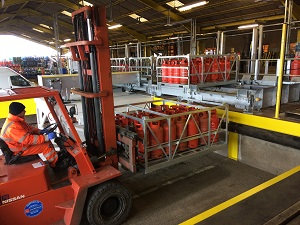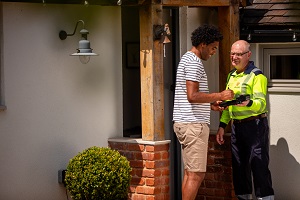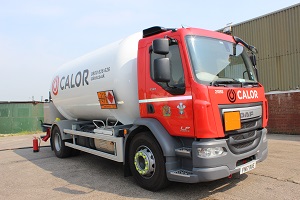CASE STUDY: Calor Gas Ltd - using Touchstar EPOD systems to optimise delivery and boost customer satisfaction
Every day, Calor supplies LPG, BioLPG, LNG and Autogas to its customers: homes and businesses off the mains gas grid. Calor provides an energy that is easy to transport, store and use, which has many versatile uses, and a limited environmental impact compared to popular alternatives.
In 2018 Calor became the first supplier to bring BioLPG to the UK's transport and logistics market, introducing a renewable and sustainable energy without compromising performance.
As well as investing in the latest energy solutions, Calor also has a history of embracing technology to improve delivery processes and provide an efficient service to keep customer satisfaction high.
 Calor has been working with TouchStar Technologies, a leading supplier of mobile data capture systems to the fuel and Fuel Logistics sector, to automate key business processes associated with distributing its products to customers.
Calor has been working with TouchStar Technologies, a leading supplier of mobile data capture systems to the fuel and Fuel Logistics sector, to automate key business processes associated with distributing its products to customers.
Mobile computing is now eliminating paperwork, reducing billing cycles and managing stock better. Secondary benefits were to be sought via the use of GPS technology, which aids job planning, vehicle scheduling and routing.
Touchstar is known for pragmatic and effective business solutions. For Calor two separate sets of software functionality were delivered, tailor made for bulk gas and bottled delivery scenarios.
Here's how it works
BOTTLED GAS DELIVERY
A typical delivery round consists of pre-round checks, the delivery of full bottles, the collection of empty bottles and post-round stock reconciliation. The day starts at the depot with the driver picking up their in-cab mobile device which has been pre-loaded, usually with the details of that day's deliveries. Drivers then check the actual load on the vehicle against the computer's record, and any differences can be fixed there and then.
Because the system has access to a database containing the full weight of every gas bottle, it also alerts the driver if the load exceeds permissible limits. The driver also logs the opening odometer reading and the load is further checked by gate security before the vehicle sets off on its delivery round. When the driver gets to the customer, the computer indicates exactly what the customer has ordered.
Sometimes a customer will request more bottles than originally ordered. Vehicle stock is managed in real time, so the system knows if the vehicle has spare stock to meet any additional customer requirements. The driver will receive a warning if the revised order means there won't be enough bottles for other customers on the delivery round.
 All empty bottles are reused. If the bottle ID is not clear, a description is found using the system's search function, which looks within its database for IDs or names. The system again alerts the driver if the weight limit or available space is exceeded as a result of the empties.
All empty bottles are reused. If the bottle ID is not clear, a description is found using the system's search function, which looks within its database for IDs or names. The system again alerts the driver if the weight limit or available space is exceeded as a result of the empties.
After the collection of empties is complete, the driver then obtains proof of delivery. The details of the delivery pop up on the screen of the computer, and the order is not pre-paid, the driver may take cash payment and records it on the device. A signed delivery ticket is then printed out using the integrated printer and given to the customer, and the delivery is complete. This ticket is digitised and its contents sent, in real-time, to Calor. Just in case, all data is also recorded on to the mobile device's data card.
At any point, a report of the vehicle's load status can be called up, along with that day's delivery history and details of the following drops. Back at the depot the driver logs the end of the run odometer reading, the incoming load is checked and validated and the day's data is loaded onto the main system. Any discrepancies can be sorted out immediately. Because each bottle has its own unique code, the progress and history of any bottle can be tracked on a daily basis. It is therefore possible to keep a close eye on batches and know exactly where any bottle is or was at a given time.
There are a multitude of ancillary features that have been built into the software to optimise the productivity of the driver. For example, for large Calor distributors, the driver is able to undertake a full stock check. Drivers can also undertake cylinder inspections, reporting on safety labelling, leaking gas, regulator function, thread connections, etc.
BULK GAS DELIVERY
A bulk LPG tank is a popular option for domestic gas users in rural, off-grid areas and certain types of business. For domestic users, LPG tanks can be discreetly placed above or below ground. Calor uses advanced telemetry system to remotely monitor the client's gas usage and alert both the back-office system and the client when the tank requires topping up. An advanced delivery notification is issued by the system to the customer so they are fully aware of delivery timescales.
For bulk deliveries, the TouchStar system provides a critical fleet management data flow between the driver, the vehicle and the office, similar to gas bottle delivery. When the driver starts the round, the driver receives details of the route and helpful additional information. This includes the exact position of the tank to be filled, not just the customer address. The mobile device links to the tank's electronic meters to record opening levels and amount of gas delivered.
The level of the customer's tank after filling is also measured and recorded, with tank volumes left at a pre-agreed percentage capacity. On completion, 'quantity delivered' and signature capture data is sent back to Calor in real time.
Location of the truck is also available in real time, which brings additional safety and security advantages. GPS navigation assistance is also particularly useful as, for example, new drivers may not be overly familiar with the geographical areas within which they are operating. Again drivers can be prompted to perform additional tasks, not directly associated with the delivery process, such as site surveys.
SYSTEM BENEFITS
The benefits derived from the availability of critical data within both the bottled and bulk gas delivery systems include;
- A reduction in the administrative resources to establish the delivery schedule and route information. Previously, the information flow between the driver and the dispatcher was handled by fax or telephone.
- Optimisation of the time spent during the delivery
- Reduction of the mileage of the trick due to more efficient routing, leading to a reduction in fuel usage and carbon savings.
Big benefits have also been realised in the area of 'proof of delivery' and customer invoicing. Previously the process relied on manual delivery notes, which could be mislaid, now this is all automated with a full audit trail.
 The TouchStar solution allows the driver to print delivery notes on the spot. A customer's signature is simply captured on screen for proof of delivery purposes and a Proof Of Delivery document is printed instantly. There have been immediate benefits in the accuracy of data and the time saved in Calor's back office. Subsequently, if there are any discrepancies over what was delivered, an electronic version of the document can simply be raised on the system and automatically sent to the customer. Prior to the system's implementation, personnel needed to manually retrieve documents from a paper archive.
The TouchStar solution allows the driver to print delivery notes on the spot. A customer's signature is simply captured on screen for proof of delivery purposes and a Proof Of Delivery document is printed instantly. There have been immediate benefits in the accuracy of data and the time saved in Calor's back office. Subsequently, if there are any discrepancies over what was delivered, an electronic version of the document can simply be raised on the system and automatically sent to the customer. Prior to the system's implementation, personnel needed to manually retrieve documents from a paper archive.
The core TouchStar software systems, with periodic version updates, have underpinned the Calor operation since their introduction in 2003. In 2019 the company decided that it would implement a large-scale hardware upgrade. The decision was made to retain TouchStar as the sole hardware supplier.
Calor used TouchStar 'Kestrel' device, which offered an integral printer, across both bottled and bulk operations. The upgrade included careful consideration of operational differences and the decision was taken to upgrade to TouchStar 'Hawk' mobile devices with 'Blaster' printers in the bulk trucks. Vehicles delivering bottled products were again fitted with 'Hawks' but, this time, combined with 'Zebra' mobile printers.
Adam Bolitho Supply Chain Project Manager for Calor, explains some of the principle reasons behind this decision:
"Calor were in the market to upgrade their outgoing 'Kestrel' OBTC devices after an impressive 13 years in service. Calor required a hardware solution that was rugged, Atex approved and capable of operating in relatively extreme environments. The TouchStar 'Hawk' device, with accompanying printer, was selected due to the simplicity of the upgrade path and safe in-vehicle installation. The 'Hawk' device also provides a 7" anti glare screen, 800mhz - 1ghz processor and Windows CE operating system capable of running the 'Calor deman' workflow software.
The 'Calor deman' software is a workforce management application, developed specifically for Calor by TouchStar, that allows distribution drivers to navigate, deliver, and process customer orders.
The deman software is fully operational on the 'Hawk' tablet and custom development was undertaken in order to accommodate the use of a fixed in cab blaster printer for bulk drivers and a mobile, Bluetooth enabled 'Zebra' printer for use across Cylinder distribution.
The implementation of the 'Hawk' solution was made easier through its existing use at Calor Ireland, as a result Calor GB had a reliable reference to help learn lessons and operate a seamless national rollout".
CONCLUSION
The final word on the success and impact of the TouchStar system again comes from Adam Bolitho:
"I have worked with a variety of hardware and workforce management software providers across my 8 years at Calor Gas, however none have provided the depth of knowledge and expertise on the successful integration of gas metering systems and auto-order reconciliation into Calors ERP system.
The implementation of the 'Hawk' devices, across both bulk and cylinder, has been extremely smooth and Calor have experienced the instant benefit of a modern, rugged, TouchStar-manufactured device running on a feature-rich software platform".
CLICK HERE TO READ THE CALOR GAS CASE STUDY IN FULL (PDF Download)